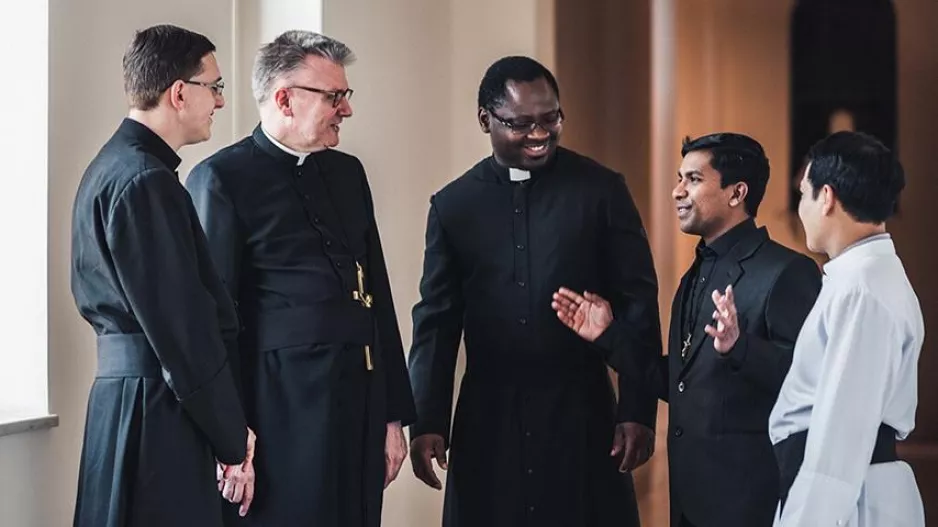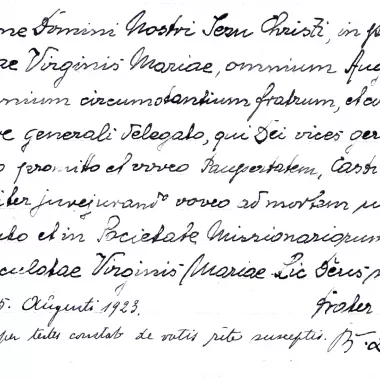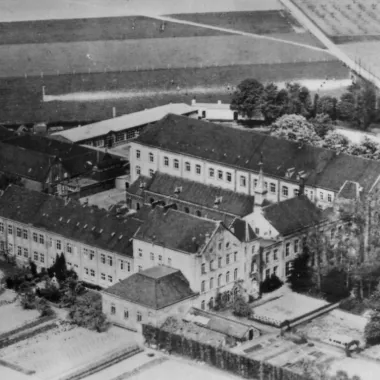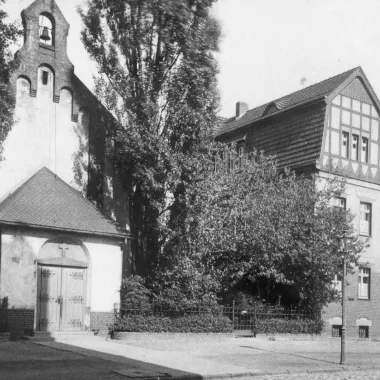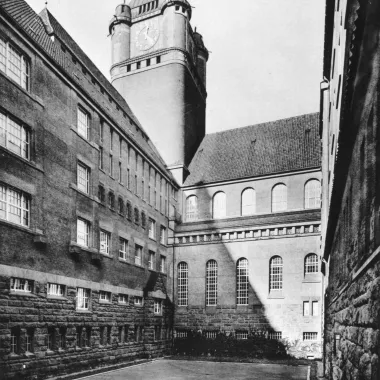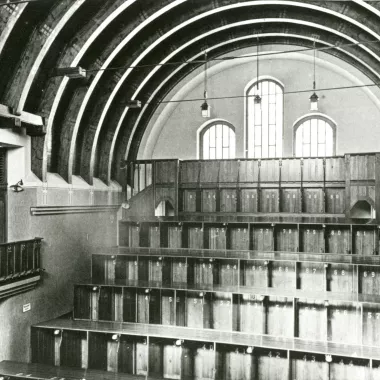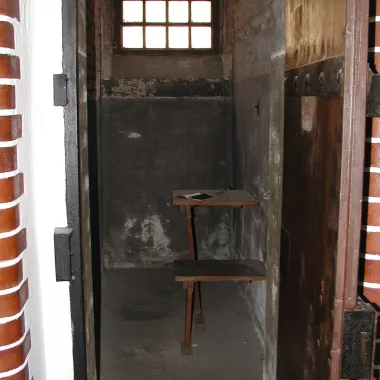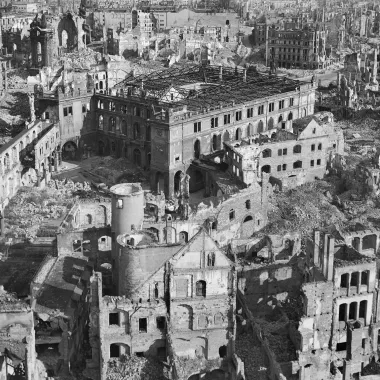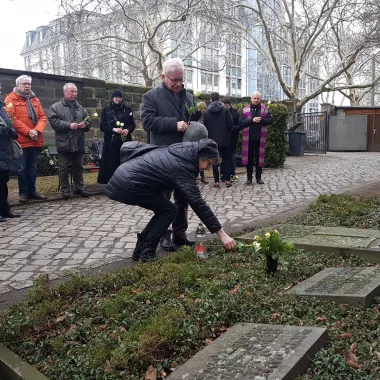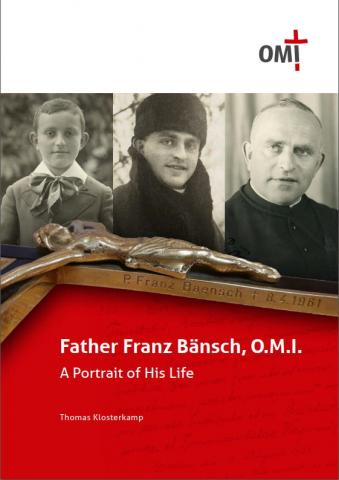Here are just three examples:
- Pastoral care for people sentenced to death: Franz Bänsch as a prison chaplain in Dresden
- Bridge builder: Franz Bänsch stands for reconciliation
- Pastoral practice in three systems: Franz Bänsch worked in the Weimar Republic, the "Third Reich" and in the GDR

Father Franz Bänsch
- Born in Großenhain/Saxony (1899)
- Family, childhood and school days (1899–1913) • Oblate Juniorate St. Karl (1913–1917)
- Soldier in World War I (1917–1919)
- Entrance into the Oblate Congregation (O.M.I.) and years of studies (1920–1928)
- Perpetual vows in Dresden (1923)
- Ordination to the priesthood in Hünfeld (1925)
- Popular missionary in Breslau (1928–1934)
- Pastor in Dresden-Plauen (1935–1957)
- Prison chaplain in Dresden (1935–1945)
- Diocesan director of men's ministry (1957–1961)
- Death after suffering a major heart attack (1961)
Leave nothing undared for the Gospel
He was born March 21, 1899, in Großenhain, north of Dresden. The Catholics were a minority in Saxony. They counted only 4.9 percent of the population. There was not even a parish in Großenhain.
The faithful parents wanted a catholic education for their son. In the Saxon diaspora, this was only possible in the Dresdner Kapellknabeninstitut (Chapel Choir Institute for boys). Franz Bänsch started school there in 1910. But the institute was not a full-fledged high school. Franz therefore had to change schools in order to take the Abitur (high school graduation).
It was the chaplain of the choirboys, Heinrich Seiler, who referred Franz to the Oblates of Mary Immaculate. Franz had been attending their missionary school in Valkenburg, the Netherlands, since 1913. The high school was geared toward preparing the future candidates of the Oblates. At that time, the desire in young Franz to become a religious must have already been strong.

World War I changed Franz Bänsch's life. At first he was not drafted, but many of his teachers and schoolmates had to go to war. In 1917, he had to report to his Saxon home to serve in the armed forces. But still he was not yet near the front. His unit was regularly shifted far behind the trenches. Franz used the time to prepare himself for the uncertain future of a soldier in the war and to "get things straight with the Lord God" in confession. Fortunately, he was spared a direct deployment to the front. After the armistice, his unit retreated to Saxony at the beginning of November 1918.
Getting things straight with the Lord God.
After the war, Franz Bänsch wanted to hold on to his vocation as a "priest and missionary" and, following his release from the military, he then got in contact with the Provincial House of the German Province of the Oblates of Mary Immaculate (O.M.I.) in Hünfeld.
My life must concentrate on the intention to become holy.
In 1919, Franz Bänsch entered the novitiate of the Missionary Oblates of Mary Immaculate (O.M.I.) at Maria Engelport. The probationary year prepared Franz for his entry into the Oblate Congregation. The idea Sc. Franz had of religious life is expressed in his diary: "I am a pessimist; I thought that one must have a certain degree of perfection…I already doubted my worthiness." Sc. Franz understood missionary religious life as a lifelong struggle: “Struggle against self-love…Fight against the world…I want to suffer, fight and pray, so that I may become a good religious priest."
What did Franz consider the aim of his life at that time? "My life must concentrate on my intention to become holy. This thought must never leave me. I must never doubt the possibility of achieving this goal, for the Savior gives enough graces to everyone. Therefore, conscientious observance of the Rules, rigorous examination of conscience, consistency in acting upon my intentions.”
In the 1920s, the Oblates founded several communities and schools throughout Germany in quick succession. They were mainly active in the popular mission. Father Bänsch was also appointed to the popular mission. After his ordination in 1925, he initially worked in Silesia since 1928.
This wandering life ended for Father Bänsch in 1935, when the provincial administration appointed him superior of the Oblate community in Dresden-Plauen. The Rules of the Oblates describe the qualities of a superior as follows: "The Superior of a community must be exemplary in his entire conduct of life [...]. He needs prudence and healthy judgment in order to be able to fulfill his leadership tasks in a level-headed manner."
Furthermore, Fr. Bänsch became pastor of St. Paulus, now assuming the pastoral care of a parish for the first time.


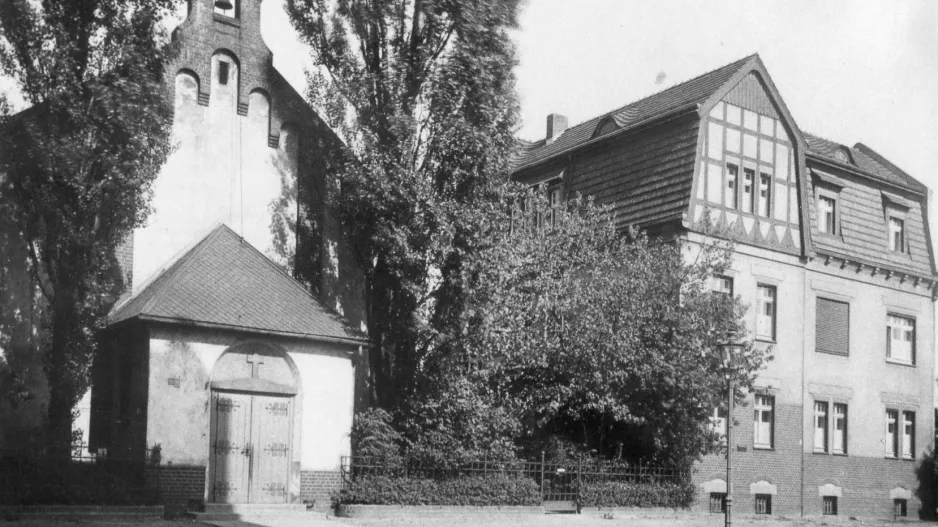
The rule of the Nazi regime presented Father Franz Bänsch with new challenges as a parish priest. In addition to the obstructions of the anti-church dictatorship, the war in particular had a strong impact on parish life. For example, since the 1940s, the pastoral care of deported forced laborers had to be organized.
This was made more difficult, because the Nazi authorities had forbidden their participation in the regular church services. This backfired on the authorities. Father Bänsch and the other Oblates conducted services in the native language of the forced laborers. Thus, Franz Bänsch had already learned Polish in 1926.
The Dresden Oblate community had a clear opinion of Hitler: "For us priests, it is a foregone conclusion that there can be no peace without the downfall of Hitler", noted the chronicle of the Dresden community as early as 1941.
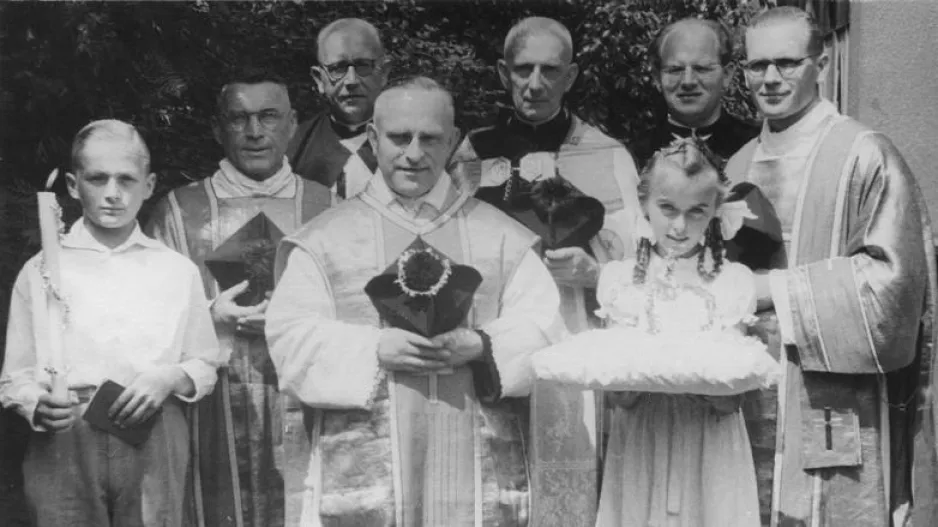

The end of the war brought about a new dictatorship for the Oblates in Dresden. The renovation of the Oblate residence and the church had to be implemented under the anti-church SED regime. In addition, pastoral care had to be reorganized in a shattered cityscape. In the process, Father Bänsch also integrated the refugees.
People recalled Father Bänsch's work in Dresden-Plauen: "His humble nature, his sense of humor, his helpfulness and hospitality opened hearts to him."
After 21 years, Father Bänsch gave up his position as pastor. Instead, he assumed the task of director of men's ministry in the diocese of Dresden-Meissen. Thus, he returned to the itinerant life of his early years: He organized conferences, worked as a Lenten preacher, visited Catholic parishes, held men's retreats and gave spiritual talks. Once again, Franz Bänsch showed himself to be a missionary who "won people over through his word and carried them away, sometimes also through his humor."
His humble nature, his sense of humor, his helpfulness and hospitality opened hearts to him.
Prison chaplaincy was actually a part-time ministry for Father Bänsch. The court, prison and execution site of the Dresden District Court were located at Münchner Platz which belonged to his parochial territory. Thus, the pastoral care for the prisoners there also fell to him.
How comforting your visits to the cell were for me
The prison chaplaincy per se is nothing special for the Oblates.The Oblate Rules of 1931 state about the prison ministry: "As charity demands, we should spare no effort to prepare those sentenced to execution for a good death.The missionaries will accompany them to the execution site and will not abandon them until they have given up the spirit.” Between 1935 and 1945, Father Bänsch maintained this claim and proved its validity when he accompanied about 1000 prisoners sentenced to death.
Direct contact with the prisoners was particularly important to Father Bänsch. The conversations immediately before the execution, when the delinquents had already been taken to death row, were intensive: "Everything was discussed with the death candidate: the memories of his childhood and youth, the events in his homeland, the development of the criminal case, the course of the war."
Franz Bänsch reports about the end of a Holy Mass on death row: "There one stood up, shook hands with each other, kissed each other goodbye. Now one was prepared for the great journey into eternity. They remained quietly and prayed."
Father Franz Bänsch perceived the death row inmates as human beings regardless of their religious attitude. A former inmate wrote to Fr. Bänsch in 1946: "How comforting your visits to the cell were for me…Every KPD man (communist) and every foreigner I spoke with in prison, they all raved about your love for the prisoners."
Sure, Father Bänsch also distinguished between the political prisoners and the criminals and murderers. In the case of the latter, it was about their individual conversion to God, but also about reconciliation with fellow human beings. The political prisoners were not criminals in his eyes. It was a matter of reconciling them with their difficult fate.
Here, the main thing was that those condemned to death did not leave the world in despair, anger and hatred, but reconciled with God on their way to eternity
- as a missionary and priest, he reconciled sinners with God;
- as a fellow man, he reconciled the righteous with their unjust fate;
- as a helper in family distress, he reconciled children with their parents;
- as a mastermind of European reconciliation, he reconciled Germans with Poles and Czechs.
Father Bänsch describes the fruits of his efforts for reconciliation as follows:
"Very many have expressly stated that they, the Czechs, don’t wish the Germans anything bad; …that they die for a reconciled and peaceful world."
However, he had not only a view for the prisoners, but also for their relatives. Even beyond death and across boundaries of nationality, Franz Bänsch sought to inform the families of the executed and to enable them to bid farewell to their loved ones in a dignified manner. For example, he transmitted the last letters of the executed to their relatives. He also tried to obtain the reburial of deceased Czechs in their home country after the war. For this purpose, he travelled to Prague in the autumn of 1945.
In the post-war years, another concern of Franz Bänsch was the appropriate commemoration for the victims of the Nazi regime in the prison at Münchner Platz. He had shown no interest in the local memorial site because he may have regarded anti-fascist manifestations of a socialist regime an impertinence. A dignified commemoration should have a spiritual character for him. So, in 1954, the laying of the foundation stone of the new Maria-Hilf-Chapel in Kleinnaundorf (near Dresden) took place. The chapel should serve as a place of remembrance.
that they die for a reconciled and peaceful world.


He preserved his humanity in an inhuman environment.
He made God tangible in a godless environment.
In doing so, he showed:
- boundless trust in God.
- unconditional humanity.
Father Franz Bänsch belonged to the silent heroes, of whom there were unfortunately too few during the Nazi era. Silent, because he rarely spoke about his work for the victims of the Nazi-terror. A hero, because he did not allow the terror regime to deprive him of his humanity.
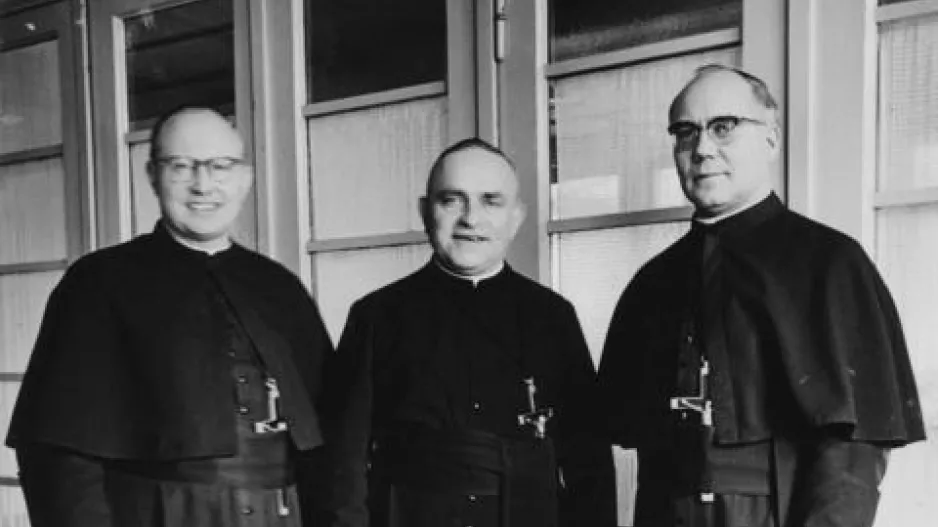
- He became a fellow human being to others by letting himself be touched without fear by strange foreign personalities, thought patterns and cultures.
- He became a simple and humble listener.
- He became a recipient of the Good News which is revealed in every merciful encounter.
- He became a companion of the poor on their last journey who have nothing more to expect from life.
For the Savior gives everyone enough graces for it.
- In 1999, Pope John Paul II beatified the 108 victims of National Socialism. Among them were six victims pastorally cared for in Dresden by Father Bänsch - the martyrs of Münchner Platz.
- In 2003, the catholic Kindergarten of the St. Paulus parish in Dresden-Plauen was named after Fr. Bänsch.
- In 2005, the city council of Dresden named a street in the city district Mockritz after Franz Bänsch.

The new book from Father Franz Bänsch OMI.
The author of the book is Father Thomas Klosterkamp OMI.
It is available in the Languages German, English and Czech.
You can get the book from the Provincial Office.
We ask for a donation.
Provinzialat der Oblaten M.I. Klosterstr. 5
D-36088 Hünfeld
Tel. +49 (6652) 94-90
fax +49 (6652) 94-920
St. Eugene de Mazenod (1782-1861), founder of the Missionary Oblates, experienced at the beginning of the 19th century the great need of the Church after the French Revolution. In 1816, he gathered a small group of missionaries in order to respond more effectively to the spiritual needs of the people. In his native town, in Aix-en-Provence, he preached in the local language of the domestics and artisans. His Oblates went from place to place, preaching, administering the sacraments, and thus strengthening the communities in the countryside which had often fallen into oblivion.
From 1841, the Oblates also worked outside France, first in Canada, Ceylon (Sri Lanka) and South Africa. Since 1895, they have also been active in Germany. Today, 3,700 fathers, brothers and students live and work in 70 countries on all continents.
Apart from the members of the Congregation, many others are also committed to the legacy of the founder of the Oblate community, canonized in 1995. They all belong to the one Oblate family: it consists of the Oblate Sisters of Mary Immaculate and the associates, men and women, who fulfil their responsibilities in family and society and who try to carry on the spirit of St. Eugene in their living environment. They are organized in local groups and bind themselves to the community with a promise.
Whether Oblates - fathers, brothers and sisters - or associates, the goal of all members of the Oblate family is to be always close to people, especially to the poor and the abandoned.

